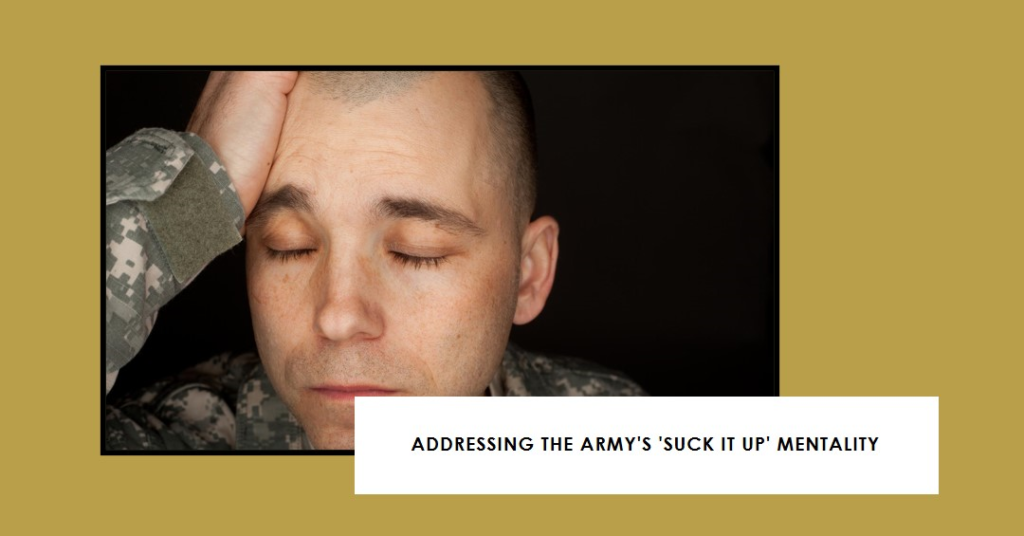
Army’s “Suck It Up” Mentality: The Biggest Issue They Refuse to Address

K Tyler
Military leaders must make soldiers’ mental health a top priority. They should create an open environment where soldiers feel comfortable discussing their emotional struggles. This helps break down stigmas and allows soldiers to flourish in life. By promoting mental wellness, the military boosts its effectiveness and readiness. The “suck it up” attitude harms service members by suppressing their emotions. It forces many to hide their feelings and suffer alone. This mindset also stops service members from seeking help, fearing they’ll be seen as weak. As a result, they don’t get the care they need. The military must replace this attitude with a culture of openness and support. By seeking help, service members can build resilience, and the military should encourage them to do so.
Soldiers are the backbone of our military, embodying not only physical strength but also a deep inner resilience that stems from their ability to confront and address their emotions. In order to support and empower our troops, it is imperative that military leaders prioritize mental health and create an environment where discussions about emotional well-being are encouraged and normalized. By fostering a culture of open communication and providing access to resources tailored to individual needs, soldiers can take charge of their mental well-being and overcome any challenges they may face. This shift towards prioritizing mental health not only helps to eradicate the stigma surrounding psychological issues in the military but also enables every soldier to thrive in all aspects of their lives. By nourishing their emotional needs and offering a supportive environment, we are not only ensuring the safety of our troops but also nurturing their mental resilience and overall wellness. This emphasis on mental health creates a sense of unity and solidarity among soldiers, making them a cohesive and effective unit that can successfully carry out their duties and missions. It is vital that we continue to advocate for mental wellness in the military and provide our soldiers with the necessary support and resources to excel in their roles and lead fulfilling lives beyond their service. Together, we can uplift and empower our soldiers, equipping them with the tools they need to succeed both on and off the battlefield. With a strong focus on mental well-being, we can enhance the overall effectiveness and readiness of our military forces, ensuring that our soldiers are not only physically capable but also mentally resilient to face any challenges that come their way.
Documents gathered by USA TODAY show that anyone with a history of "self-mutilation, bipolar disorder, depression, drug and alcohol abuse can now seek waivers to join the Army under an unannounced policy enacted in August." Opening Army recruitment to persons with mental health issues is a move taken in line with the service's difficult target of 80,000 new troops by September 2018. The Army welcomed more recruits who performed badly on aptitude tests, raised the number of exemptions approved for marijuana use, and paid hundreds of millions of dollars in incentives in order to fulfill last year's target of 69,000. Lt. Col. Randy Taylor, an Army spokesman, said in a statement that expanding the exemptions for mental health is feasible in part as the Army now has more medical data about every prospective recruit.

In 2009 the Army banned exemptions in response to an army-wide suicide pandemic.
I was among the numerous others who tried suicide after my stay at FOB Wright came to an end in 2011. But my situation was more of a consequence of issues with our command structure with respect to equal opportunity than of a mental health crises. I suppose toxic units with a history of negative relations with people of color are under-appreciated. These racial disparities plagued me for three years of duty with the 10th Mountain Division at Fort Drum, New York. "The decision was primarily due to the increased availability of medical records and other data which is now more readily available,"
“The decision was primarily due to the increased availability of medical records and other data which is now more readily available,” Taylor’s statement to USA TODAY said. “I was on hold for re-entry and came across someone on Federal charges who got into the Army ahead of my medical waiver.” “These records enable Army officials to better capture applicant medical histories.” However, Elspeth Ritchie, a psychiatrist who resigned from the Army as a colonel in 2010 and is knowledgeable with exemptions for military duty, says admitting recruits with severe mental health issues in their background has hazards. She noted that persons who have a history of mental health concerns are more likely to have such problems return than those without such background.

"It raises questions," she said. "What degree of a red flag is it?" According to the Diagnostic and Statistical Manual of Mental Health Disorders, which the American Psychiatric Association publishes, self-mutilation—where individuals cutting their skin with sharp instruments—may indicate more severe mental health problems even if bipolar illness can be maintained under control with medication.


